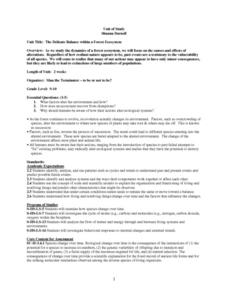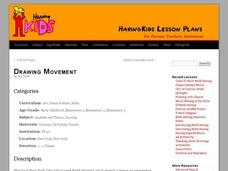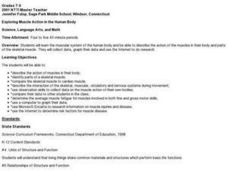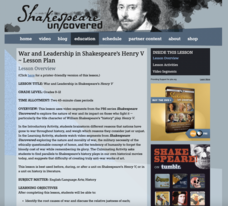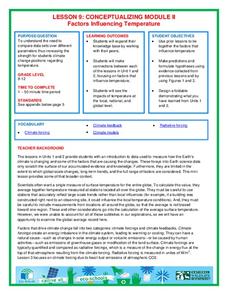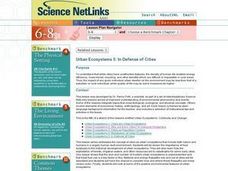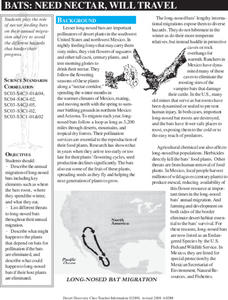Curated OER
Do You Have the Strength?
Students examine the strength and resilience of the human heart. They squeeze a tennis ball to demonstrate the strength of the human heart, record and analyze the results on a worksheet, and create a poster of a design of a device to...
Curated OER
The Delicate Balance within a Forest Ecosystem
Students examine the causes and effects of alterations in a forest ecosystem and evaluate how human actions may only seem to have minor consequences, but can lead to extinctions of large numbers of populations. Students produce an...
Curated OER
The Many Uses of Trees
Young scholars list all the ways humans use trees and tree by products. In this lesson students watch a video, discuss the impact trees have on humans, and research common products made from trees. The young scholars use their findings...
Curated OER
Fabrics and Polymers
Students explore natural resources by reading a science story in class. In this fibers lesson, students identify and discuss the differences between fibers such as wool, silk, rayon, linen and cotton. Students identify the common uses of...
Curated OER
Drawing Movement
Students analyze visual arts by creating drawings in their classroom. In this art analysis lesson, students identify the paintings of Keith Haring by researching the web. Students utilize paper and oil pastels to create paintings based...
Curated OER
The Human Organism
Students identify their feelings and learn constructive ways of handling conflict. In this feelings and conflict instructional activity, students read a story about conflict and identify ways to understand emotions and resolve conflict.
Curated OER
Human Power or Machine Power
Middle schoolers compare different means for accomplishing tasks. They explain benefits and liabilities for the above different means. Exploration is studied in photos of laborers, animals and machines doing work.
Curated OER
We Are Unique - Yet Also Alike
Sixth graders compare their lives to trees and make connections between the two, consider how trees are metaphors for people, and draw and label trees to represent themselves. Students then read brief stories, fables or nursery rhymes,...
Alabama Learning Exchange
Nature's Life Cycle
Become a member of the Pollution Patrol and stand up to litter! After discussing the life cycle of seeds and discussing how plants figure into the food chain, young conservationists engage in several activities involving podcasts,...
Curated OER
Jack London's The Call of the Wild: "Nature Faker"?
Students examine how Jack London tells a story from the point of view of an animal. They read and discuss primary source documents, analyze text and excerpts, complete a chart, and explore various websites.
Curated OER
Exploring Muscle Action in the Human Body
Students collect and graph data and use the internet to research the skeletal muscles.
Curated OER
Introduction to Human Anatomy & Physiology
If the only support you are in search of is lists of vocabulary terms, this presentation may fit the bill. Slides simply list terminology. These categories are included: hierarchy of structural organization, cell functions, cell...
Howard Hughes Medical Institute
Got Lactase? The Co-Evolution of Genes and Culture
Does the human body evolve as quickly as human culture? With a stellar 15-minute video, explore the trait of lactose intolerance. Only about 1/3 of human adults seem to still have the enzyme lactase and therefore, the ability to digest...
Curated OER
Watershed Documentary
Students research and produce an iMovie documentary about the human and natural history of a stream basin (watershed).
Curated OER
What Is in the Water?
Students compare bottled water qualities to water found naturally in a pond habitat. They research their state's laws/regulations in regard to bottled water and study the advertising, cost, and quality of brands of bottled water. They...
Curated OER
Life in a Hurricane Zone
Students research the effects of living in a hurricane zone. In this hurricane zone lesson, students research the impact of natural disasters on humans and the environment, and write a press release describing the devastation of...
National Wildlife Federation
Quantifying Land Changes Over Time Using Landsat
"Humans have become a geologic agent comparable to erosion and [volcanic] eruptions ..." Paul J. Crutzen, a Nobel Prize-winning atmospheric chemist. Using Landsat imagery, scholars create a grid showing land use type, such as urban,...
Curated OER
Understanding the Nature of Work
Students analyze case studies of child labor situations and differentiate between developmental labor which can benefit children and exploitative labor which can harm children. Then they look closer at forms of exploitative labor to...
Shakespeare Uncovered
War and Leadership in Shakespeare’s Henry V
“Compared to war all other forms of human endeavor shrink to insignificance.” “War is not healthy for children and other living things.” These two views of war, embodied in George Patton’s statement and Lorraine Schneider‘s famous 1966...
National Wildlife Federation
Conceptualizing Module II - Putting It All Together
"Creativity is just connecting things." - Steve Jobs. After weeks of researching climate change, the ninth lesson in a series of 21 combines the data and analysis to address essential questions. It covers natural phenomenon, human...
Curated OER
Urban Ecosystems 5: In Defense Of Cities
Students explain that while cities have unattractive features, the density of human life enables energy efficiency, mass transit, recycling, and other benefits which are difficult or impossible in rural areas. This is the fifth in an...
Curated OER
Water Pollution
Fifth graders study the impact of human activity on water quality and on the ecosystems of Earth. After a discussion on the various ways that water can be polluted, groups of youngsters get together to figure out the best way to clean a...
Curated OER
Introduction to the Romantic Age of English Literature
Introduce your class to the elements of Romanticism with these slides. The foundations of the movement, the roles of imagination and nature, and the value of art are all highlighted. Features of Romanticism are explained such as...
Curated OER
Bats: Need Nectar, Will Travel
Beginning wildlife biologists become adult bats, baby bats, snakes, owls, bobcats, or land-clearing developers in a grand role-playing activity. In a large open space, they play a game in which they move to designated areas based on what...
Other popular searches
- Philosophy of Human Nature
- Democracy and Human Nature
- Essays on Human Nature
- Human Nature Hobbes
- Human Nature Good
- Enlightenment Human Nature
- Human Nature in Plays
- Human Nature Environmental
- Poetry on Human Nature
- Aristotle Human Nature
- Human Nature Enviromental



